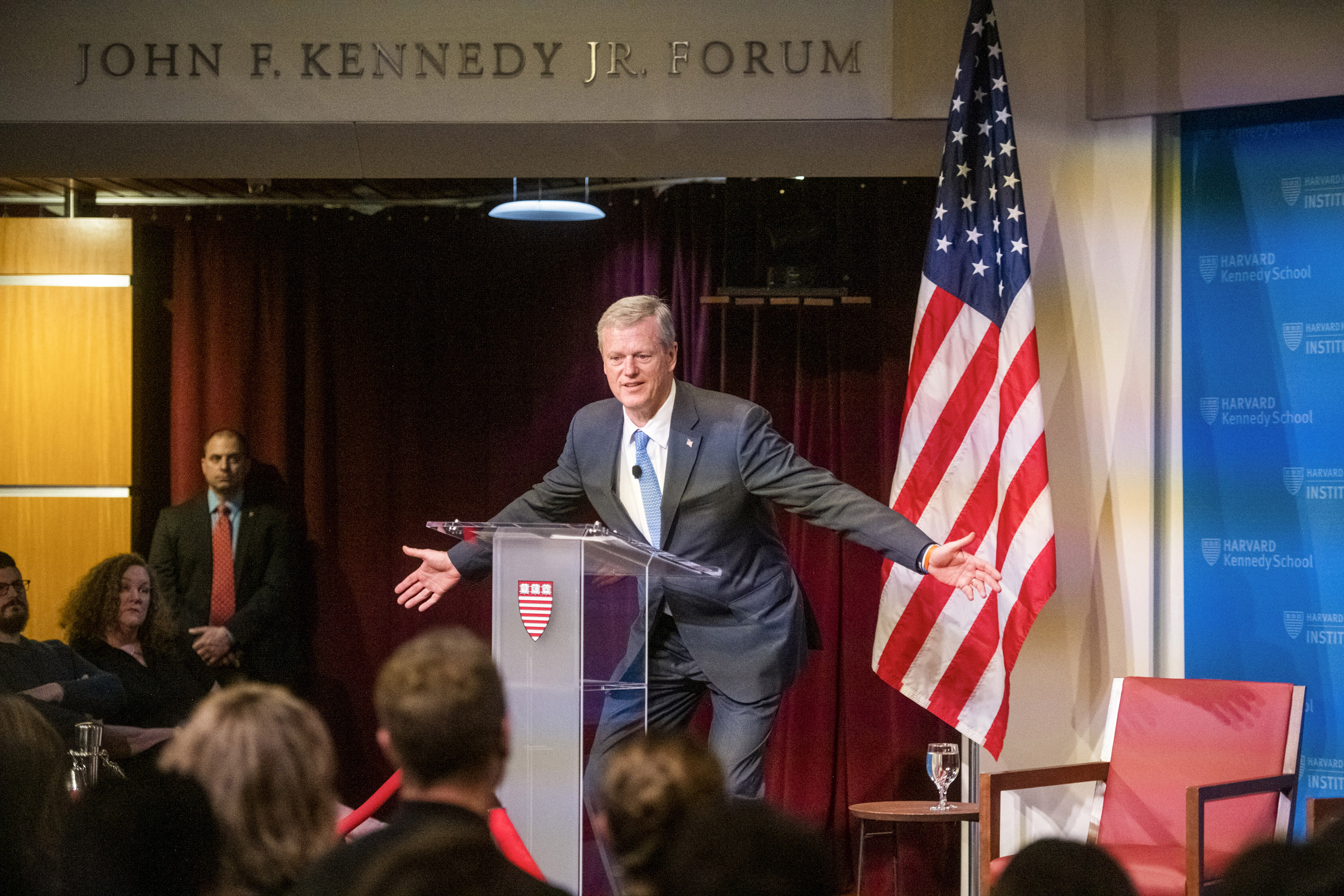
“Public service needs the public, not just the professional politicians,” said Gov. Charlie Baker, who encouraged students to get involved in government and public service, regardless of their level of experience.
Jon Chase/Harvard Staff Photographer
Baker blames social media, political operatives, press for fueling divisiveness
Two-term GOP governor says TV character Ted Lasso offers sound advice: Be ‘more curious and less judgmental’
Technology has been feeding Americans an ever-more-distorted picture of what our government leaders are up to and who we are as a country, and it’s doing lasting damage to our democracy, said Massachusetts Gov. Charlie Baker in an address at the John F. Kennedy Jr. Forum at Harvard Kennedy School on Thursday evening.
Social media’s rise and dominance in politics has had “profoundly negative consequences” for how citizens engage — or disengage — with other Americans and with the political process.
“Finding people who share your love of gardening is just as easy as finding people who share your love for hate speech,” said Baker during his delivery of the Godkin Lecture. That ease of connection can be a positive, but he blames it for “a lot” of the growing extremism in both the Democratic and Republican parties.
“Our problem is not the values, views, and hopes and aspirations of most Americans,” he said. It is the negativity and divisiveness driven by the political class, including the press, which is then amplified by social media algorithms, that is souring the public’s view of politics.
“Most Americans are less partisan, less bombastic, and less combative” than those working in and reporting on our politics and government, and “their cynicism about politics is often the result of what they read and hear from their leaders” online, he said.
He pointed to the growth of registered Independents and the shrinking ranks of the two major parties as evidence of Americans’ growing distaste for partisan discord in the nation.
Voters “want all forms of media, and those who serve in public life, to focus less on the charges and countercharges of the day, and more on the very real problems that this country faces and most importantly, what their plans are to deal with them. They don’t expect perfection, but they absolutely expect collaboration and progress.”
The son of a Republican father and a Democratic mother who argued policy and politics every night at the dinner table, Baker garnered widespread praise from Democrats and Independents, despite being a Republican, for largely avoiding partisan battles and taking a more technocratic approach to governing. He gained attention nationally for his steady oversight during the COVID-19 pandemic and ability to avoid getting the state embroiled in political debates sparked by the opposition of then-President Donald Trump to some public health directives. Baker, who was first elected governor in Nov. 2014, leaves office in January.
Harvard President Larry Bacow, a longtime HKS faculty member, said Baker “represents everything that we would hope a Kennedy School graduate would be — somebody who’s passionately committed to public service, somebody who cares deeply about how government can be more efficient and better, and in doing so, benefit its citizens and the public.”
Baker, a 1979 graduate of the College, reflected on how much technology has changed the way we gather and process information since his time at Harvard. Back then, scouring the Out of Town newsstand in Harvard Square after midnight to grab bulldog editions of local and national newspapers felt like getting a jump on the news before it happened. Forty-five years later, cellphones and social media have radically transformed the way we live and relate to the world around us, a huge shift we don’t always understand or fully appreciate, he said.
Baker pointed to a prophetic BBC interview with David Bowie in 1999. He quoted the rock star as saying, “The potential of what the internet is going to do to society both good and bad is unimaginable … I think we’re on the cusp of something exhilarating and terrifying. The actual content and the state of content is going to be so different from anything we envision at the moment where the interplay between the user and the provider will be so insimpatico it’s going to crush our ideas of what mediums are all about.”
Baker encouraged students to get involved in government and public service, regardless of their background or level of experience. “Public service needs the public, not just the professional politicians,” he said.
Closer to home, Baker said the “No. 1 problem” facing the MBTA is a shortage of workers to fill vacant jobs. About 1,000 openings remain unfilled, forcing bus routes and service to be curtailed. He also defended the 30-day shutdown of the MBTA’s Orange Line in August, saying it allowed five years of necessary repairs to be done in a month and that the next governor would have “a much better system” as a result. The relentless criticism of the T by the press — “some deserved, some not” — has helped drive the public’s negative perceptions.
While he said he didn’t know where the Republican Party is headed in the future, Baker said he expected non-MAGA Republicans to leave the party, with many enrolling as Independents, a trend that may have irreversible effects on the GOP and harm the two-party system.
As a two-term Republican governor in a Blue state, Baker quoted fictional TV soccer coach Ted Lasso, who seemed to have the right idea: “The way through this morass is to be more curious and less judgmental.”
The annual address is named for Edwin L. Godkin, a celebrated Irish-born journalist and editor of American newspapers in the 19th century, most notably the New York Evening Post. At the urging of Frederick Law Olmstead and others, Godkin was founding editor of The Nation in 1865, a journal that sought to cover the day’s current affairs in a bold, nonpartisan fashion.




